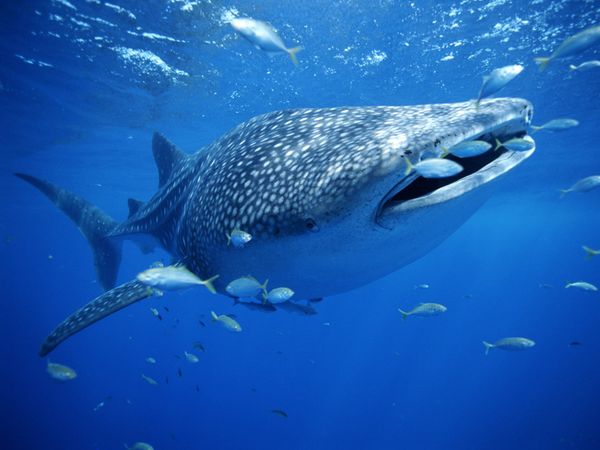The whale shark is unique, size wise it’s the world’s largest fish, with no known natural enemies. It takes at least 25 years for it grow to maturity and, unlike other fish, is born live like whales. Despite its size it moves slowly, often near the surface of the water. This makes it a popular attraction for aquatic tours all over the world. It is unknown what the whale shark population is, estimates range from 30,000 to over 3 million(Maldives Whale Shark Research Programme). However, these enormous creatures remain elusive and difficult to track because of their migratory behavior; following food sources and ideal ocean temperatures thousands of miles(The Nature Conservancy).
Currently the whale shark is listed by the International Union for Conservation of Nature (IUCN) as vulnerable for extinction, and is most affected by man-made threats. This means that the greatest threats are a result from human interactions. Because whale sharks spend so much time near the surface they often get hit by high speed boats and ships. Besides accidentally getting trapped in fishing nets, they are also hunted illegally which may be the greatest threat to the species. In the long term pollution and rising ocean temperatures ultimately determine whether this species will survive in the wild in the future.
The thought of potentially losing the whale shark to extinction should stir inside everyone some desire to act in support of its conservation. However, too often this thought is followed by assumptions like “I’m only one person. I can’t possibly make a difference.” Or “I don’t live anywhere close, so there isn’t anything I can do.” In reality thoughts like this are the most detrimental to the survival of the whale shark. The fact is there are amazing opportunities small and large for everyone regardless of where they may live. The Maldives Whale Shark Research Programme has volunteer opportunities, conducts research, and works to raise awareness. This and a plethora of other conservation organizations accept donations and provide opportunities for you do your part to protect whale sharks and other endangered species.
But don’t think your first attempt to make a difference needs to be the biggest, start small by using reusable grocery bags, buying less bottled water, recycle, or make small donations to respected organizations. But when you’re ready step it up a notch, check out these sites for opportunities to continue to make a difference.
Currently the whale shark is listed by the International Union for Conservation of Nature (IUCN) as vulnerable for extinction, and is most affected by man-made threats. This means that the greatest threats are a result from human interactions. Because whale sharks spend so much time near the surface they often get hit by high speed boats and ships. Besides accidentally getting trapped in fishing nets, they are also hunted illegally which may be the greatest threat to the species. In the long term pollution and rising ocean temperatures ultimately determine whether this species will survive in the wild in the future.
The thought of potentially losing the whale shark to extinction should stir inside everyone some desire to act in support of its conservation. However, too often this thought is followed by assumptions like “I’m only one person. I can’t possibly make a difference.” Or “I don’t live anywhere close, so there isn’t anything I can do.” In reality thoughts like this are the most detrimental to the survival of the whale shark. The fact is there are amazing opportunities small and large for everyone regardless of where they may live. The Maldives Whale Shark Research Programme has volunteer opportunities, conducts research, and works to raise awareness. This and a plethora of other conservation organizations accept donations and provide opportunities for you do your part to protect whale sharks and other endangered species.
But don’t think your first attempt to make a difference needs to be the biggest, start small by using reusable grocery bags, buying less bottled water, recycle, or make small donations to respected organizations. But when you’re ready step it up a notch, check out these sites for opportunities to continue to make a difference.

 RSS Feed
RSS Feed